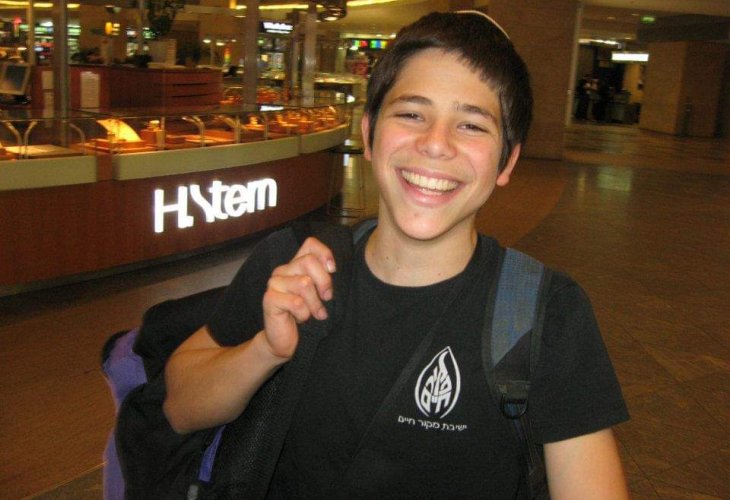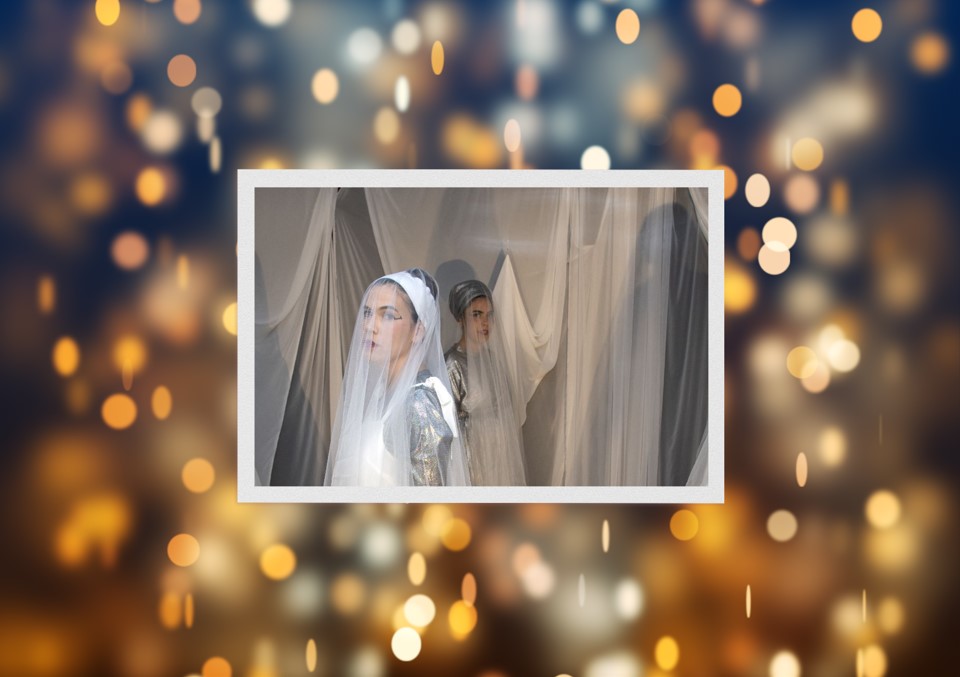"Our Shabbat of Blessings Became Seven Days of Mourning, Our Lives Changed Forever"
During their week of *sheva brachot*, Shelly Erlich and her husband faced tragedy when her brother was killed in an accident. Eleven years later, Shelly and her sisters perform a play that embraces the pain alongside joy, and continuity alongside the enduring memory of their brother.
 Yonatan, of blessed memory (Photo courtesy of the family)
Yonatan, of blessed memory (Photo courtesy of the family)When Shelly Erlich, Eliyana Rachamim, Maayan Efrati, and Hillel Peleg take the stage together, the atmosphere in the hall is electrifying. It's hard to tell if it's the riveting storyline of the play they're enacting, their exceptional acting skills, or perhaps the unique combination of four sisters performing together—a rarity indeed.
Only upon learning their personal story does one understand the profound secret behind the success of the play 'Make Room'. This is not just another play; it is based on a personal story the four sisters have shared, essentially reflecting their lives.
 Photo credit: Erik Shapira
Photo credit: Erik ShapiraLives Change
"We are four sisters," Shelly begins to explain. "We grew up with parents who made aliyah from South Africa and the USA to Israel and settled in Petah Tikva—a family of four daughters and a son. Our home was always filled with music, many Shabbat songs around the table, a father who loves singing, and a dominant mother. There was always a lot of laughter and joy at home.
"About 11 years ago, our lives changed completely at what was the happiest period of my life, during my *sheva brachot* week, right after my marriage. Though I'm the eldest, Eliyana and Maayan got married before me, so there was a great celebration when I got married. The *sheva brachot* was supposed to be held at our uncle's home in Petah Tikva, and we all set off. I traveled with my husband and youngest sister Hillel, while my other sisters arrived in separate cars. My brother Yonatan, who was studying at the 'Mevo Haim' yeshiva in Gush Etzion, was also heading to the event. He got off at a dark intersection between Rosh HaAyin and El'ad, tried to cross the road, but was struck by a car and killed on the spot. We were very close to the accident site, and I remember contemplating that we should pick Yonatan up on the way, but he didn't answer his phone. Meanwhile, there was a huge traffic jam, and it was announced there had been an accident. We never imagined it was connected to us.
 Illustration: shutterstock
Illustration: shutterstock"We finally arrived at the *sheva brachot* and sat around the table. From the first moment, it was clear something had happened. My parents arrived but didn't even sit down; they went straight to the kitchen to try and understand what was going on, as nothing was yet clearly told to them. Around the table, some tried singing and sharing words of Torah, but the atmosphere was tense, and no one could rejoice. Every time there was a knock on the door, everyone jumped. Eventually, my parents left everything and went to the hospital because they were told they could only get answers there. My sister Eliyana and I stayed at the table, insisting to ourselves that 'the worst couldn’t have happened'. We thought maybe Yonatan fell, perhaps his phone fell out of his pocket, or maybe he accidentally got a ride in the wrong direction. We couldn't fathom that 17-year-old Yonatan, full of life, would no longer be with us. But the worst was indeed true; that night, we understood our lives had completely changed, and each of us sisters began her journey, a journey of facing the difficult, complex sides of life."
Shelly takes a deep breath and adds, "In my case, I experienced the extremes most tangibly, as the seven days of *sheva brachot* turned into seven days of mourning. I had to learn many laws I hoped few ever need to know. For instance, it was told to me that mourning laws did not apply to me until after the *sheva brachot*, and I was not allowed to perform 'keriah', the tearing of garments. With Yonatan's funeral happening on the eve of Purim, on Taanit Esther, there were specific laws regarding the holiday and giving of mishloach manot, including not being 'comforted' as mourners but only 'visited'. I remember we had to eat the festive meal of Purim, but we could hardly do it, so we ate somewhere behind the house, and when we added the *sheva brachot* blessings to the grace after meals, I broke down. It felt bizarre—to be in deep mourning, yet blessed for the *sheva brachot*. Even afterwards, people would comfort us with 'Hamakom yenachem et'chem' and also say 'Mazel Tov' in one breath, an unimaginable mix the heart couldn't contain.
"The play we are performing addresses this conflicting, clashing place—where we find ourselves in the world when we need to maintain our sanity during the greatest sorrow, and we have to learn to live with it."
Intermixing Sorrow and Joy
"I wasn’t the bride during the accident; I was 'just' the bride’s sister," Maayan Efrati, the primary initiator of the play, recounts. "But I too went through a difficult journey and a major confrontation. I think each of the sisters faced a struggle from different angles since nothing in life remained as it was. This led us to create the play.
"In my case," she shares, "I was a third-year theater and drama student. Back then, I was at a very advanced stage of my studies, required to present acting exercises and a year-end project, but I couldn’t write anything unrelated to mourning, loss, and death. All my works focused on these topics, probably because it was all so fresh, and I was too vulnerable. It wasn’t right. I remember sharing a scene before theater critics, receiving feedback that made me collapse. I burst out, saying, 'But I'm not acting here, I'm genuinely crying over my life.' Then I understood with their help that it was still too fresh and I couldn't yet address the issue artistically. It made me put everything away and wait for a suitable time.
"Over the years, I continued in acting and dramatic writing, my main pursuits to this day. All my sisters love these fields; they are all verbally skilled, with abilities in writing, dancing, and singing. Although they don’t pursue it daily, they are heavily engaged in it. Throughout the years, we all had the opportunity to write about what we experienced and knew a time would come to process the materials into a play. Repeatedly we communicated about the ongoing challenge—the impossible conflict between joy and sadness.
 Photo credit: Erik Shapira
Photo credit: Erik Shapira"As the years passed, this conflict intensified. Since Yonatan's passing, while we experienced great mourning, simultaneously, our family expanded considerably. Even within that year, more grandchildren were born, including one on his *yahrtzeit* anniversary. We found ourselves transitioning from *brit* ceremonies to birthdays, and our parents' home filled with much laughter, joy, and small grandchildren. There was abundant good and happiness alongside the immense loss. About three years ago, our youngest sister Hillel married, and once again, we found ourselves in such great joy, grateful and happy despite difficult memories of the previous wedding and what followed. The more we discussed it, the more we realized we weren't alone in facing this kind of challenge."
What do you mean? Most of us, thank God, don't face such tragedies...
"You're right," Maayan agrees, "but that's precisely the point. We aren't talking in the play about the tragedy of 'our brother was killed', but reaching out, inspired by our personal story, to anyone who has experienced loss, regardless if it's of a young family member or a grandparent who passed in old age. The struggle to reconcile sorrow with life and joy accompanies them as well. It's also true for situations of job loss, relationship breakdowns, or any loss of significance. It’s a message implied from the content, not stated outright, but inherent within the core idea."
Offering Embrace and Empathy
How do the four of you manage to create a single play?
"It was quite an experience," Shelly and Maayan recall with smiles. "It was an amazing opportunity for the four of us to meet weekly to develop the material, write it, and share tears," Maayan explains.
"We shared experiences that each of us went through, stories we were unaware of about each other," Shelly adds, "and from all we wrote and shared, we began to build something presentable to an audience. Next, we collaborated with a professional director—Daniela Bokeriss Lieberman—realizing we were too close to the story to direct it professionally enough."
"Daniela was incredibly sensitive and professional," Maayan emphasizes, "she managed to join us in the process, diving deep into the pain, on one hand, and engaging with humor and laughter, on the other, translating everything into one large piece of work."
What exactly does the play cover?
"The play doesn’t depict our personal story but is inspired by it," Shelly stresses. "It’s not a narrative with a beginning, middle, and end but a meeting with a central character who experiences a loss early in the play, navigating her life's stations as a woman while seeing the loss from different perspectives—whether becoming a mother, raising children, celebrating, or later as her daughter marries. She experiences pain, surmounting it, guilt, along with feelings of continuity, and many conflicting emotions that we've all felt. We hint in the play about how it impacts those who come for consolation visits—what’s appropriate and what isn’t in those contexts."
What do you think makes your play so special that it touches people's hearts?
"I think we touch on a topic somewhat difficult to discuss in Israeli society," Shelly reflects aloud. "Unfortunately, there are many tragedies in Israel, young people leaving this world, but society lacks actual mechanisms to address and give it a place. Sometimes it feels when a national catastrophe occurs, like a terror attack, there's a way to honor and acknowledge it, but when death seems random—like a car accident—who hears about it, who talks about it? We've tried giving legitimacy to such situations, offering identification, embrace, and empathy to those dealing with similar issues, giving them a sense of being seen."
How did your parents react to the play? Did they see it?
"Of course. It was very important they see the play first," Maayan answers. "We performed just for them, debating whether to continue the play to the end. Ultimately, we did continue, finishing it, and the parents were very emotional. They support, rejoice, and are proud that as four sisters, we accomplished this, but it's clear it brings up painful emotions; it’s not easy, as even after 11 years, the pain remains."
And how do you feel about surfacing this pain?
"It eases us because feeling we’ve provided added value to others also helps us," Shelly explains. "I think there was an internal feeling within us to bring the issues out, to share insights and emotions."
As religious women, do you think faith helped your coping over the years?
Shelly: "I'm sure it did, and it's reflected throughout our play. We talk a lot about the gap between joy and sadness, continuity and finality. It's clear the depth of these matters rests in faith, as ultimately it's what holds us up and drives us to continue growing. This message of faith reverberates greatly."
"We chose to end the play with Avitar Banai's song 'Av Harachaman'," Maayan adds, "as it expresses our simplest feelings—ultimately, even in downfalls, we fall into the open arms of the Father of Mercy. He's always there to lean upon, and only from him comes the strength."
And we must ask—where can we see your play?
"For now, we've done some internal shows for piloting and exploring purposes, and in less than a month, we'll start with three premiere performances at the Doron Theater Petah Tikva, at the Tarbuta Center in Oranit, and at the Harish Culture Center. After that, we’ll take a short break, as one of us is about to give birth, and we hope to continue from there."

